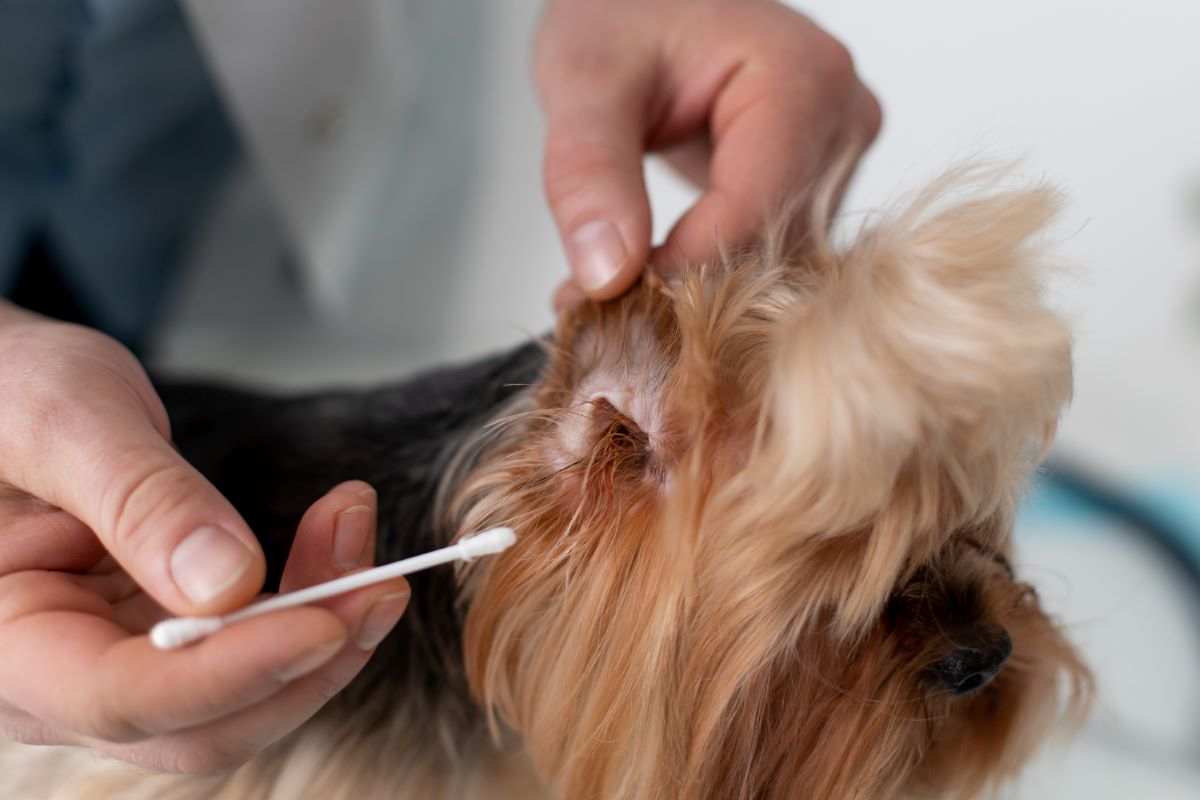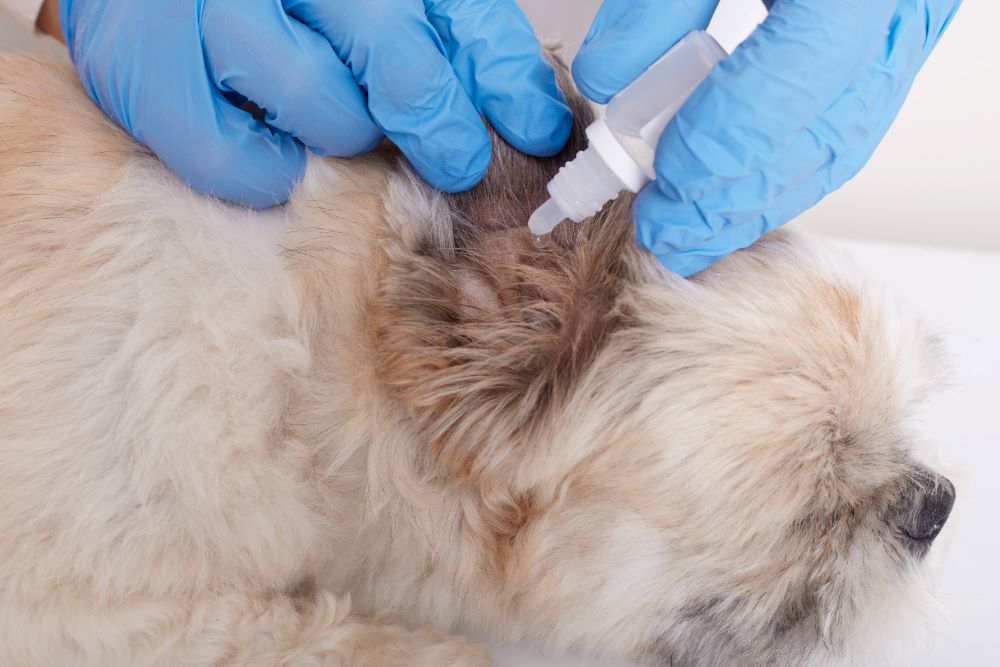Cocker Spaniel is a dog with natural and beautiful long ears. However, they need proper care as they are prone to ear-related health issues. Neglecting ear health can lead to pain and discomfort. It can lead to some severe issues. So you need to ensure good hygiene to keep these ear conditions at bay. In this article, we’ll explore everything you need to know about your beloved pet’s ear condition and emphasize the importance of caring for your Cocker Spaniel’s ear health throughout.
Common Cocker Spaniel Ear Problems
The first essential thing in caring for your Cocker Spaniel’s ear health is to learn what can cause ear problems in your Cocker Spaniel. So, let’s learn about some of the major Cocker Spaniel ear problems:
Otitis Externa
Otitis externa is an ear condition characterized by inflammation of the external part of the ear. The most common cause of otitis is infection from yeast or bacteria. There could be excess moisture in the area, which fosters the growth of these microorganisms.
Other causes of otitis externa include hormonal disorders, allergies, or poor hygiene. Some signs of this condition are increased sensitivity due to pain, head shaking or ear scratching, inflammation, and waxy discharge that gives off a foul odor.
Ear Mites
Mites are small crab-like creatures that can infest your Cocker spaniel’s ears. They could irritate the ear and cause signs and symptoms like otitis externa. There are distinctive dark bumps in mite infestation, which resemble coffee grounds.
This problem can be prevented with proper techniques of cleaning Cocker spaniel ears.
Canker
Plant matter and grass seeds can enter your Cocker’s ear and cause poor air circulation, consequently increasing humidity levels and wax accumulation on their ears. Ear canker is the resulting condition, which is a fungal disease that could cause ulcers.
Aside from pain and irritation, your dog might display head shaking and tilting to one side. The ear could also excrete a foul and dark-colored discharge.
Cocker Spaniel Ear Disease: What Causes It?

- Cocker Spaniel has a long and beautiful ear and this is one of the reasons they are vulnerable to ear diseases. Their long ear can trap moisture, debris, and bacteria. This overall trapped environment creates a breeding ground for infections.
- As the ears are long, during Cocker Spaniel baths or swimming humidity in the air can get trapped in the ear canal which leads to the growth of bacteria and yeast and infections.
- Cocker Spaniel dog breeds are very prone to allergies, which can manifest as ear infections. Food Allergies can do a huge damage to the ears. Allergic reactions can increase earwax which makes the ears more prone to infection.
- Another reason is not aware of proper cleaning techniques of the ear. If you neglect ear cleaning it can harm ear tissues.
- Ear mites can do a lot of damage to Cocker Spaniel’s ear. These tiny external parasites can cause intense itching and irritation. These innocent dogs scratch their ear due to ear mites which can lead to infections in the ear.
- Some Cocker Spaniel dogs are genetically prone to ear diseases. Due to their breeding process, a huge number of Cocker Spaniels face ear issues.
Proper Techniques for Cocker Spaniel Ear Cleaning
Choose a good veterinarian to decide whether regular cleaning is a must for your Cocker spaniel. Before you follow these steps, discuss with your vet the suitable options appropriate for your pup.

1. Weigh the Pros and Cons of Ear Cleaning
Weekly ear cleaning for your cocker spaniel can help you spot ear infections early while also decreasing the amount of wax.
However, if the ear cleaner you choose is ineffective or poorly formulated, the skin might soften and weaken. It increases the chances of infection, which could make cleaning more of a problem than a solution. So you should always try to use the best type of ear cleaning kit.
2. Avoid Cleaning in Particular Situations
If your Cocker Spaniel has existing conditions like balance problems, head tilt, or if they are displaying signs of ear pain, they could already have a ruptured eardrum.
Introducing any fluid when they have this problem could pose severe harm. If any of these signs and symptoms are present, you must bring your Cocker to the vet ASAP.
3. Ask for Recommendations
There are plenty of ear cleaner brands online that you can purchase without a prescription, but you should consult with the vet before you give it to your Cocker. Ask for expert advice regarding recommended cleaning solutions that are safe and effective for your dog. Also, check our comparative guide that illustrates the best ear cleaner for Cocker Spaniels to keep their ears clean and healthy.
Some of the significant features you need to look for in-ear cleaners include pH balance, the readily evaporating, and cerumenolytic solution to prevent it from pooling in the skin. Unsuitable ear cleaners can cause maceration or the weakening and softening of the skin.
4. Locate Your Dog’s Ear Canal
Without proper tools, it could be not easy to see into the ear canal. With your dog resting in a sitting position, bend their ear flap back and apply the solution to the channel carefully. When your Cocker is receiving medicated ear drops, you must use the cleaner at least 30 minutes before administering the medication.

Be cautious not to touch the tip of the ear cleaner bottle to the canal because it could contaminate the material and cause infection. Avoid using cotton buds or an applicator tool as it can push wax further down the ear canal, which leads to other problems.
5. Massage in the Cleaner
To ensure that the solution is delivered throughout the ears, you can gently massage the ear area for about 20-30 seconds. This action helps soften the wax and other foreign buildup inside for easy extraction.
There might be discharges after applying the solution, which you can wipe away using a cotton gauze or ball. You may dab mineral oil on the cotton if needed.
6. Don’t Stop Your Dog from Shaking Their Head
Fluid dripping in the ear canal can cause discomfort for your dog, which prompts them to shake their ears and head. You don’t have to stop them from doing so, as it helps them ease the feeling.
However, if you notice irritation or excessive scratching after the application, it could indicate that your dog is suffering from an infection.
Tips and Precautions to Maintain Cocker Spaniel’s Ear Health

By taking proper precautions you can prevent a lot of ear damage from your Cocker Spaniel. So let’s learn some of the tips and precautions for caring for your Cocker Spaniel’s ear health:
Know the Symptoms:
Otitis externa and other ear infections have signs and symptoms that you can watch out for when you suspect it on your Cocker. For example, they can display frequent head shaking, scaly skin, redness, and swelling in the area, and foul discharge.
Trim Their Hair:
Underside hair growing on the ear flap can impede airflow, which makes treating infections more difficult. You can trim their hair frequently to make them accustomed to the process.
Check Their Diet:
Food allergies can sometimes cause ear infections. If regularly cleaning Cocker Spaniel ears does not seem to work, it could be that their food intake is the root of the problem. Please consult with the vet regarding this concern so they can accurately diagnose your dog and give you a healthy food diet.
Protect the Ear Canal During Bath:
Bathing your Cocker Spaniel can introduce excess moisture to the ear canal. To ensure no irritation or buildup, you can use a cotton ball to block your pooch’s ear canal before bathing.
Wrapping Up Caring for Your Cocker Spaniel’s Ear Health
Caring for your cocker spaniel’s ear health ensures their well-being and happiness. Like children, dogs need proper hygiene and monitoring of their health. When they are in tip-top shape, they give off an infectious energy that can also make you feel better.
Be sure to inspect their ears regularly and consult an expert right away when you notice anything unusual.

I have a 7 mo old Cocker with no problems so far. I was told 2 keep Zymox around if I noticed any ear p
problems. Is it a good product. I have the Otic Enzymatic Solution . Also Hydrocor 1.0 anti itch